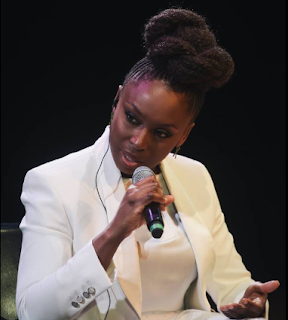Nigerian author, Chimamanda Ngozi Adichie was the guest of the Monde Festival, which was held from 5 to 7 October in Paris and she touched on quite a number of interesting topics.
The discussion was moderated by Maryline Baumard, editor-in-chief of "World Africa". During the powerful interview held at the Opéra Bastille on Sunday, October 7, Chimamanda denounced the "dishonesty" of the debate on immigration, evoked her identity as an African woman and her feminist struggle.
Chimamanda, while addressing Donald Trump's description of Africa as a "shithole country", gave an answer that was pithy and sharp and got her a loud applause from the audience.

She said:
There are things that are said by people and we do not care! Because we know that it comes from a sidereal vacuum.
Speaking on the migration policies of European governments, starting with that of the French head of state, the Americanah author said:

The debate around immigration in Europe is really very narrow, shrunken. It is necessary, but the way it is laid is dishonest. He is trying to demonize people who want only a better life for themselves and their children, whereas he should look at the conditions in Africa, and the why of these conditions. France must talk again about its relations with Africa, talk about colonialism.
she urged France to make his introspection on his role in the countries of Francophone Africa and his responsibility in their situation today, their current difficulties, adding:
The history of humanity is a story of movement, of displacement. We just have to make peace with this , insisted the writer living between the United States and her country, Nigeria. Since the dawn of time, human beings have needed to move , and this will continue . It's not just about economic circumstances, it's just because people want to see something else.

It is this message that Ms. Adichie wanted to convey in her novel Americanah.
I wanted to tell a love story because I love love. But a realistic love story, a story about things such as paying rent, with imperfect people , she said. I also wanted to talk about Africa that is never told, about Africans who do not flee war or poverty, but live in the United States, England, because they want to have more.
A spectator then says, "Thank you for speaking about Africans other than from the point of view of war and poverty! "

The author of Dear Ijeawele; The Feminist Manifesto also asked that Africa be thought of differently than through "condescending debates"
On the question of "black" identity, Ms. Adichie said:
Yes I am Nigerian, yes I am a woman, I am a feminist, yes I am black. But why do we stick a label of identity to those who are not white? I recognize myself as a person. I want to be what I am!
She added:
I think incresingly I just want to be able to have all the multiple things that I am. But what I am not, for example is, I am not an American. I really am not.I'm a person who has a home in America, a person who likes America but I'm not American.In the US I'm also Black. I'm happily Black. But in Nigeria I'm not Black because we don't so Black. And so...It's true. I get off the plane in Lagos and I don't think about race, because I don't have to think about race. And then gender becomes so much more present. I get into the US, it's race and gender. So, it's that thing that's always shicting and moving.

(photo credit: Lucas Barioulet / Le Monde)
Chimamanda Ngozi Adichie denies being "an activist".
To be a writer who is Nigerian and Black and all of those things and feminist means that people constantly want to read me politically, and I also sometimes want to resist that.Because I want... I want to talk about love as well. I don't always want to be... Which is also why I feel quite conflicted about now being called an activist. I'm really not. I mean, real activists are doing the real thing. I'm just sitting on stage an blathering on.
But it is no less with the strength of an activist she explains the urgency to think differently of masculinity, to change the status of women, saying:
You really have to raise children, boys and girls, differently from the youngest age. And especially rebuild masculinity. Because feminism will never reach its goal without the involvement of men. Masculinity, as built, is part of the problem. Men must be tough to show their strength. It should be done so that men can be vulnerable, show their emotions.
She added:
It would be great if the macho was also a crying guy, and who thinks that violence is terrible.
Watch the video below.


